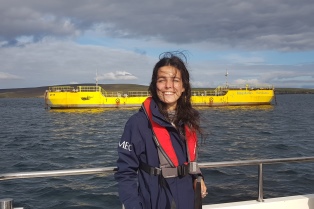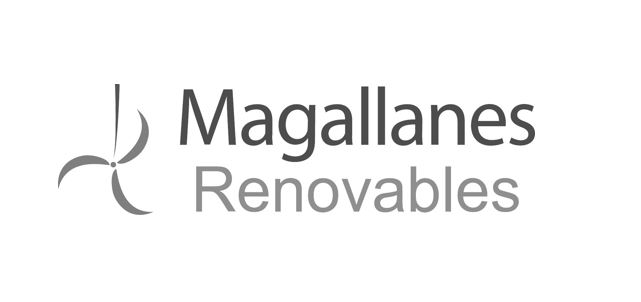PhD case study – Lara Santos
Name: Lara M. Santos Ayllon
Start year: 2021
Final year: 2024
PHD Overview
PhD
Exploring the justice dimensions of emerging energy technologies: a responsible innovation and energy justice inquiry into marine renewables and green hydrogen in island communities.
Funded / supported by
- Energy Technology Partnership
- University of Edinburgh
- European Marine Energy Centre
- Heriot-Watt University
Summary of PhD
Marine renewables and green hydrogen are two emerging technologies in the ongoing processes of innovation. Both are being tested at the European Marine Energy Centre (EMEC), an innovation catalyst operating as a research and development (R&D) test and demonstration centre in Orkney.
Given their emerging nature, there is opportunity, and risk, associated with how these technologies will be developed and deployed including, for instance, the contestation of marine spaces, distributional inequalities around pricing, access and ownership, job creation, energy flows and procedural inequalities around consultation and decision-making. The nature of technological infrastructures themselves and adjacent institutional and social processes have the power to embed new ways of living into our world as they are deployed. Thus, this research aims to explore these emerging technologies which are not yet ‘locked into’ our current system of living, through justice and responsible research and innovation frameworks.
The rationale for this project is driven by
- the overarching understanding that a just transformation of the socio-energy system is also a decision to live in a different type of society, not simply a low-carbon version of the current one;
- the fact that, such transformations are cultural and behavioural as well as technological, requiring a holistic, justice-oriented, socio-technical approach;
- marine renewables and hydrogen are emerging technologies with distinctive characteristics; and
- the Orkney Islands are an ‘innovation hub’ where various socio-energy realities co-exist and which will undergo a green revolution in the next decade, additionally providing insights transferrable to other contexts.
This research has three objectives:
- To investigate marine renewables and hydrogen conceptually, empirically and methodologically, intertwining notions of justice with responsible research and innovation to result in socially informed and improved outcomes from their deployment;
- To focus on marine renewables, hydrogen and their specific justice risks and opportunities, given their role in our future energy system; and,
- To apply and analyse justice, innovation, marine renewables and hydrogen dynamics in relation to Orcadian communities and the archipelago’s energy futures, and critically, with potential to subsequently use these insights to foster knowledge exchange in other contexts.
Why?
Why is this research of interest to you?
The energy transition alongside the wider response to the climate crisis is arguably the biggest opportunity we have as a human society to transform our ways of living, away from unjust, exploitative and ultimately unsustainable practices with each other, and the natural ecosystems we coexist within. It has been thoroughly demonstrated that there is a window of opportunity for change, which closes rapidly when new commitments are made, processes are fully established and built infrastructures are deployed – at this point, transformation becomes slower, more costly and ultimately, harder to enact.
Orkney, EMEC, marine renewables and green hydrogen combine into an extremely rich set of contexts, actors, histories, infrastructures and futures, within which to apply novel forms of thinking about energy and innovation on technological objects (marine renewables and hydrogen fuel, alongside their associated infrastructures and processes) which are not yet massively deployed – and are yet, hopefully, within the window of opportunity for change.
Why did you choose to go down this route?
I enjoy academic research massively and firmly defend there is practical value behind academic theorising. This has always been my drive within academia – to connect the practical with the theoretical. An industry based, social sciences PhD, which are not yet too common, particularly in the energy sphere, enables me to do exactly this, in a field where, both theoretically and industrially, non-technical thinking has been marginalised.
Why is the research important?
It is safe to say that the energy field, across industry, academia and policy, has now openly acknowledged the role of social impacts, and justice more generally, in energy decision-making (albeit not always to the same extent). The wind and solar energy industries have been extensively researched, with hindsight, on issues of justice and deployment, shedding light on critical risks, harms and also opportunities in these scenarios.
Nonetheless, marine renewable energy and hydrogen have not yet been assessed from such a perspective. Yet climate urgency and ambition are exponentially increasing as are commitments, hence technological developments and deployments will likely follow the same trends. Given the critical role that marine renewables and hydrogen will play in decarbonisation, the sectors must learn from past mistakes and make use of appropriately informed and defined impact frameworks, prior to their deployment. This will inform their design and deployment process from the outset.
While justice thinking commences from a human-centric dynamic, it has increasingly extended to encompass more-than-human, interspecies justice considerations. We must shift away from a narrative of ‘growth’ for the sake of it, to prioritise human and ecological wellbeing and sustainability as our priorities when investing and developing technologies. How technologies are designed and deployed can either embed or disregard these considerations. This work looks towards embedding them within marine renewables and hydrogen. Examples of a shift in this direction include well-being economy thinking, which Scotland has already pledged to.
Additionally, both marine renewables and hydrogen offer significant opportunities for socioeconomic development, particularly in coastal and island territories which have traditionally suffered at the end of supply chains. This characteristics inherent to these technologies offer potential for clear restorative, distributive and climate justice for particular territories. Alongside emissions reductions and rising wellbeing, this presents a compelling argument to truly understand the positive versus disruptive impacts that these technologies can bring, to drive them, and mitigate them accordingly.
The earlier potential risks and opportunities are identified, the greater our ability to avoid, mitigate and respond to them. Research within legal schools of thought is already pointing at the emergence of ‘justice risks’ in relation to energy technologies, and how these will transform our understanding of ‘commercial risks’, and in doing so, of finance, insurance, and decision-making processes, amongst others.
It is increasingly understood that market uptake of renewables is not solely dependent on levelized cost of energy (LCOE) and technology readiness. Stakeholders are key determinants of market uptake and can also be critical barriers to effective technology deployment. LCOE itself can be brought into question as an accurate measure to determine the value different energy sources bring to our energy mix. All of these presupposed concepts and methodologies require unpicking if we truly wish to transform our world for the better.
Work on marine renewables already provides indications of struggles regarding marine space contestation, ownership and aesthetics, amongst others. Hydrogen is noticeably different to other forms of renewables considered to date, insofar as it will need to be directly adopted by consumers, integrated into daily lives.
Why is the research important to EMEC?
As an R&D and innovation catalyst, EMEC is dedicated to changing things and trying new ways of doing. The organisation’s ability to do so depends critically on accessing the natural resources available in Orkney, on the existence of these emerging industries and on local community acceptance of the trials that take place. Understanding local perceptions and needs will enable EMEC to be proactive in managing expectations and will provide foresight when considering future actions.
Moreover, EMEC will be able to advise clients and projects from a novel perspective which this research brings, supporting developers in understanding the sociological nature of their technologies and methods of best practice. This will also provide EMEC with a noticeable knowledge advantage in consortium projects, given this research has not been carried out as proposed to date.
What challenges is it aiming to overcome?
This work aims to bridge silos within justice thinking, alongside key frameworks such as ‘responsible research and innovation’ which has become institutionalised in innovation funding. It aims to bring a whole-systems lens to the challenge of technical arenas which have until recently been thought of as standalone. Throughout the fieldwork, this research aims to be as responsible and inclusive as possible, acknowledging different worldviews and types of expertise ranging from local community members to industry leaders. Finally, by putting discussions of justice on the table, this work hope to further shed light on the opportunities to hand in renewable energy technology development to create a socially and ecologically sustainable world. This is not an easy task for anyone, given mainstream thinking in the public and private sectors continues to be driven overwhelmingly by cost motives. The hope, however, is to contribute to moving these discussions along, as many others have done before me, in the emerging space of marine energy and hydrogen.
Where now?
Where are you working now?
I am based in industry at EMEC and my PhD is full time, so I spend most of my time researching. Alongside this, I do a bit of work for EMEC on an ad hoc basis and university tutoring within one of my supporting universities.
What does the future look like for you?
At such an early stage in my PhD the future is very much the next stage of my research. The focus of my second year will be field work and data analysis. I am really looking forward to travelling Orkney and speaking with multiple different stakeholders to unpick the justice dynamics, risks and opportunities embedded in the technologies of study.
Testimonial
“While this PhD route may be a little less conventional and therefore straightforward to secure, it has already been an invaluable experience to start a PhD settled within the industry that is the focus of the study. Being based at EMEC throughout the duration of this work is a great privilege, providing direct insight into how the industry moves and changes, and the challenges and opportunities around these devices. I am also surrounded by experts working in the industry, who have experienced first hand the dynamics embedded in these devices and their innovation process.
“There are some ethical dimensions to consider from an academic lens, in terms of conducting responsible research, and ensuring transparency to avoid conflicts of interest. This is important and manageable, and all part of the experience.
“Finally, working both with academic supervision, from different universities and scholarly backgrounds, alongside an industry supervisor, offers a breadth of interesting perspectives on the subject matter, from which to draw key synergies. All in all, as a social scientist looking for the opportunity to apply theory to practice while working across disciplines, including the technical and the social, this route has worked out to be a great fit.”
Videos
Lara discusses the purpose and context of her PhD in Science Talks: A justice and responsible research and innovation exploration of marine renewables and green hydrogen in island communities.
Papers
- Energy justice, Just Transitions and Scottish energy policy: A re-grounding of theory in policy practice | Energy Research & Social Science, Volume 96, Feb 2023
- Just Transition: A whole-systems approach to decarbonisation | Climate Policy, Volume 22, Aug 2022







